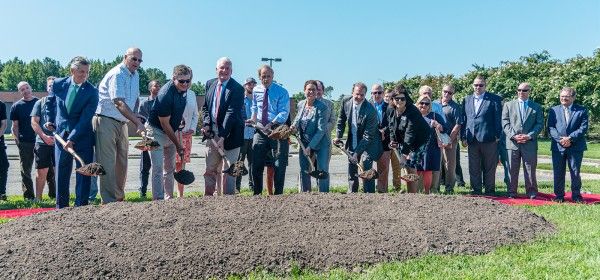Delaware’s Manufacturing Sector is Supported by Unique and Growing Workforce Training Efforts
Delaware’s manufacturing sector is supported by unique and growing workforce training efforts
(Wilmington, Del.) Manufacturing in America continues to be the largest economic multiplier of any industry sector, according to the National Association of Manufacturers. Delaware’s manufacturing and advanced manufacturing sector are supporting that growth.
Kurt Foreman, President and CEO of the Delaware Prosperity Partnership, the public-private partnership that manages economic development for the state of Delaware, says that approximately half the companies looking to expand in Delaware or relocate to Delaware fall into the manufacturing sector.
A strong workforce is needed to support this growth. In Delaware, a unique training program that starts in high school is ensuring there are eager and qualified professionals to support the sector. The Pathways to Prosperity program continues with training and degree options at regional colleges and universities, including Delaware Technical Community College and proceeds into adulthood with widely-available “up-skilling” programs for existing manufacturing workers to grow and advance in their fields.
Delaware’s Pathways programs are gaining in popularity among students and their parents. This year, there was 33% growth in the students expected to complete the advanced manufacturing pathway, offered through Delaware Tech. The growth is expected to continue.
Worth nearly $5 billion and accounting for more than 96% of the state’s global exports, Delaware’s manufactured goods industry is robust, creating deep supply chains and supporting the market entry and growth of new businesses. The manufacturing sector is one of the largest employers in the region, accounting for 5.6% of total employment in Delaware and 6.7% in the broader region.
Delaware’s manufacturing sector includes a robust advanced materials manufacturing sector with structural and fabricated metals, paper products, electrical equipment, aerospace products, printing, and furniture. The manufacturing and logistics sector intersects with Delaware’s science and technology sector, with firms like Agilent and Chemours producing chemicals and medical devices and with the food and agricultural sector with firms like Pepsi Bottling Ventures and Kraft Heinz manufacturing food and beverage products.
Delaware has a wealth of competitive advantages for manufacturing, advanced materials manufacturing and logistics companies. Delaware’s strategic location allows companies to reach more than 50 million people within 250 miles; and public and private investment is rapidly expanding existing infrastructure. Most notably, the Port of Wilmington—already a full-service, strategically located Mid-Atlantic seaport serving more than 200 million North American consumers—is set for $600 million in upgrades in coming years. Competitive tax rates make choosing Delaware highly attractive, especially when compared to other states in the region.
Additional Competitive Advantages
- Close proximity to major airports, with international and domestic cargo capabilities
- Major International port, four hours from the Atlantic Ocean
- First Foreign Trade Zone to receive approval with an Alternative Site Framework
- Freight rail services throughout the state
- Well-connected roads, with I-95 in Northern Delaware, the most-travelled interstate in the U.S.
For more information about advanced manufacturing in Delaware, visit the Delaware Prosperity Partnership’s website.
About Delaware Prosperity Partnership
Created in 2017, Delaware Prosperity Partnership (DPP) is the nonprofit that leads the state of Delaware’s economic development efforts to attract, grow and retain businesses. DPP works with site selectors, commercial developers and business executives focused on where to locate or grow a business. The team helps with reviewing potential sites, cost-of-living analysis, quality-of-life information and funding opportunities, including available tax credits and incentives. For more information, visit www.choosedelaware.com.
Newsletter Sign Up
Stay Up To Date With Delaware






